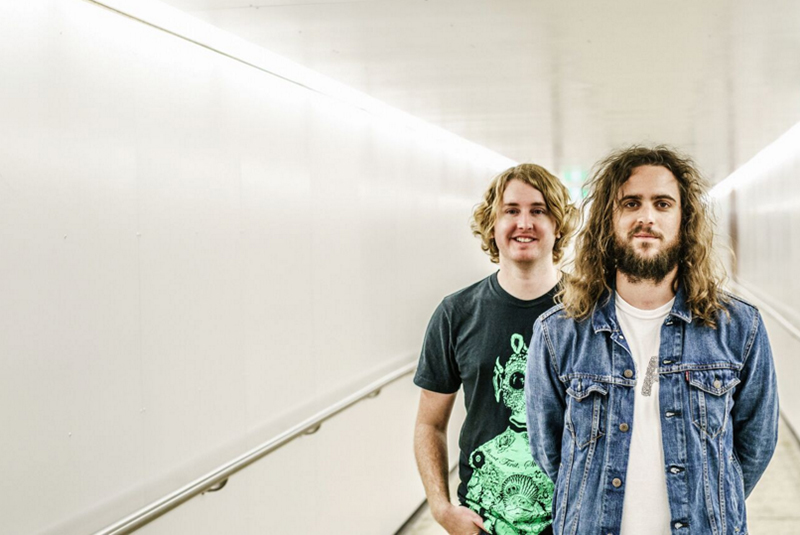DZ Deathrays: Return to the U.S.
Music Interviews
After three years, DZ Deathrays have returned to the United States. For the last eight years, the Australian duo of Shane Parsons and Simon Ridley have showcased their dance-punk anthems around the world. Their shows have a wild and loud reputation, and their music attracts all kinds of listeners from hardcore enthusiasts to EDM artists. They’ve had a lot of international success touring in Europe and now they have returned to try to grab America’s attention. SLUG had the opportunity to speak with Ridley at the beginning of this year’s SXSW. In the hot sun on the way to check in to his hotel, he shared his thoughts on being at the festival again and bits on how the band got to where it is today.
SLUG: How many SXSW sets have you played so far?
Ridley: We played one last night just before midnight, which was pretty good, and then today is the day off. We’ve got like three more left for the rest of the week.
SLUG: Nice, and you guys have played SXSW before.
Ridley: Yeah, man. This is like our fourth year playing here.
SLUG: What’s the difference between playing in Australia and here in the U.S.?
Ridley: We are still trying to make a name, whereas people back home know who we are. We’ve been playing there—you know, hundreds and hundreds of shows. So I guess people sort of feel comfortable coming down to the shows to check us out, but I think it’s starting to turn around. Like last night, people were starting to try to crowd surf and that sort of thing, which is awesome. It’s kinda like what the shows are like back home—just the whole couple hundred people going crazy in a room sort of deal.
SLUG: Have you guys ever gotten seriously hurt at one of your shows given how rowdy they are?
Ridley: Not seriously hurt. Like occasionally, we’ll walk offstage bleeding and that sort of thing—but nothing too crazy. No one’s died or anything like that yet, which is good. I’ve seen people get knocked out before which is kinda bad … which is pretty bad, actually [laughs] … There’s been like two or three where someone’s been K.O.’d in the pits and then they’ve been taken off to first aid, and we always try to run over straight after the show to make sure they’re ok. But luckily, everyone seems to have had a good time. Even the people that get fucked up [laughs] are always like, “Ah, thanks. It was a great show,” and we’re like, “Are you serious?”
SLUG: Right now, what is your favorite song to play?
Ridley: Currently, it’s “Ocean Exploder.” We like to finish the end of our set with that—really slow it down into like this old-school metal ending, which is pretty funny, because none of the rest of the songs really sound like that. Keep people on their toes, you know?
SLUG: Yeah, I mean, it’s really interesting how you guys have been able to push out this new sound. Obviously from the beginning you guys were kind of characterized as “thrash punk,” but you’ve come out with your ballad, “Northern Lights,” and a lot of stuff off of Black Rat really pushes what everyone was anticipating.
Ridley: When we began the band, the initial idea was [that] it’s just music to play at a house party, which means, you know, at the start of a night, you play rock-ish punk music, middle of the night you can play sort of dance music, and then at the end of the night, slower sort of ballads. So as long as it kinda fits in that category, we feel like we can just put it out
SLUG: Yeah, yeah. I like that you guys chase after dance-punk or stuff similar to that. I think you guys characterize that particularly well in the song “Dollar Chills.” Can you give any insight to how you achieved that?
Ridley: Do you ever listen to a band called Does It Offend You, Yeah? They’re a UK electro-punk band and I think that song was pretty influenced by those guys: huge beats—like dance beats with big cymbals—and 121/125 sort of BPMs, just so everyone can bounce to us.
SLUG: Pointing now to your songwriting processes, how has that changed since your early releases, like Ruined My Life and the Brutal Tapes?
Ridley: We used to live together and actually we both used to live in Brisbane. Now Shane lives in Sydney. So initially we would just, you know, get in a room and just jam around, try to find some stuff that we like and just keep working on it that way. But now I’m kinda more by the Internet. [Parsons will] write a riff or I’ll write a beat, and we just email it to each other and just back and forth until we find something we like.
